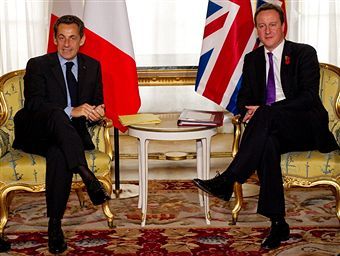 When it comes to pomp, Britain and France are still superpowers. The entente
très cordiale has brought out all the plumage of 400 years of professional soldiering – bearskins, ostrich feathers, mink, gold leaf, thorough-bred horses, billowing capes and vibrant
shades of scarlet and blue. Waterloo must have been a hell of a fashion show, before the guns inaugurated spectacle of a different kind.
When it comes to pomp, Britain and France are still superpowers. The entente
très cordiale has brought out all the plumage of 400 years of professional soldiering – bearskins, ostrich feathers, mink, gold leaf, thorough-bred horses, billowing capes and vibrant
shades of scarlet and blue. Waterloo must have been a hell of a fashion show, before the guns inaugurated spectacle of a different kind.
As Liam Fox explained on the Today programme, this agreement enables two ailing but still ambitious powers to project force overseas beyond their specific territorial interests. They will share aircraft carrier capabilities, nuclear research secrets, and a pool of elite combat forces to be deployed as a rapid a reaction force of brigade strength (roughly 6,000 men, armed to the teeth).
The command structure will be modelled on that which Nato has been operating in the Balkans and Afghanistan, where troops often find themselves under the command of officers of a different nationality. The two nations will maintain sovereign capabilities where their interests are not mutual. In the Falklands for instance, Britain will maintain a submarine presence and substantial ground-based airpower supported by roughly 1,500 troops – the aim is to deter aggressors or sink them en route. Also, presumably, the French could opt out of an Anglo-American operation of which they disapproved politically, such as the Iraq War.
Fox is keen to depict this pact as part of France’s re-integration with Nato. That is only partly true. As I wrote last week, European nations are coming to terms with the strategic implications of the emerging east and an increasingly isolationist USA. France and Britain account for nearly half of European defence expenditure – formal coalescence of their interests is significant for the future of the continent. This is not the first step to a common EU defence policy, but one could certainly be facilitated on the back of Cameron and Sarkozy’s signatures.






Comments